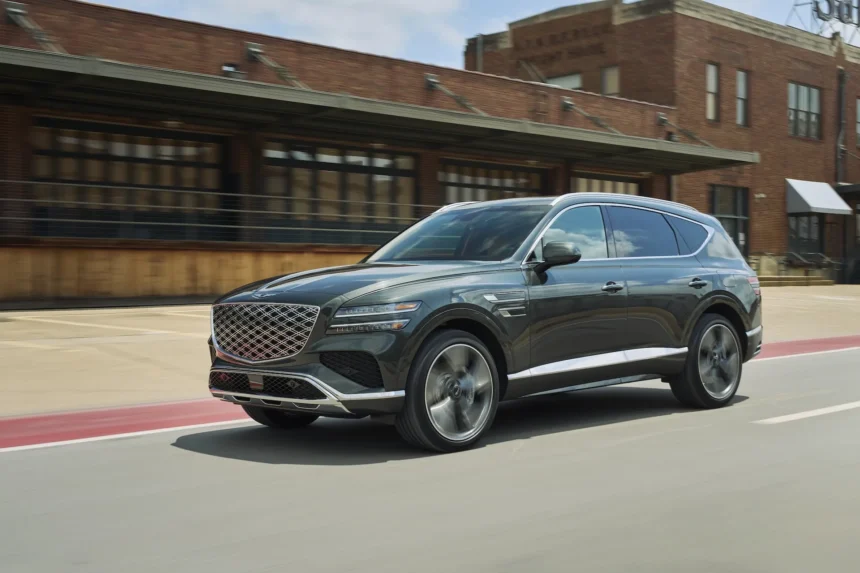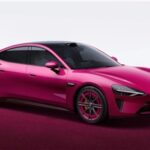The Genesis GV80 has been turning heads since its launch in 2021, and it continues to impress with its latest updates. The luxurious midsize crossover SUV now offers a third-row option to seat seven passengers, or a sportier coupe-like variant to compete with European SUVs like the BMW X5 and X6, Audi Q7 and Q8, and Mercedes GLE-Class.
The GV80 has already proven its worth by winning the prestigious Best Luxury Car To Buy award for its perfect blend of size, style, luxury, and value. While the price has seen some annual increases, it remains a top choice in the luxury SUV market. The addition of the Coupe variant shows that Genesis is aiming to compete with the top European luxury brands.
The 2025 GV80 SUV design maintains its bold and beautiful aesthetic, with a striking metal crest-shaped grille, split LED headlights, and a sleek character line that runs through the fenders. The Coupe variant takes these design elements to the next level, with a more rounded roofline and integrated rear spoilers that give it a sportier look.
Under the hood, the GV80 SUV offers a choice of a 2.5-liter turbo-4 engine producing 300 hp or a twin-turbo 3.5-liter V-6 with 375 hp. The Coupe model comes with the same V-6 engine, as well as a mild-hybrid version that boosts output to 409 hp. The advanced suspension system, optional on the standard SUV, enhances the Coupe’s handling and performance.
Inside, the GV80 Coupe features a sleek and modern interior with a 27.0-inch touchscreen display that houses the instrument cluster and infotainment system. The cabin is adorned with premium materials like etched metallic surfaces, knurled dials, and quilted leather, adding to its luxurious appeal.
In terms of safety, the GV80 comes equipped with a host of standard features including automatic emergency braking, adaptive cruise control, active lane control, and blind-spot monitors. Optional safety features include a blind-spot camera, surround-view camera system, and a head-up display.
The 2025 Genesis GV80 is available in various trim levels, with prices starting at $59,050 for the base model and going up to $87,100 for the top-of-the-line mild-hybrid version. The GV80 is manufactured in Ulsan, South Korea.
Overall, the Genesis GV80 continues to impress with its combination of style, luxury, performance, and value. Whether you opt for the spacious SUV or the sporty Coupe variant, the GV80 is a top contender in the luxury SUV market. The world of technology is constantly evolving, and with each advancement comes new opportunities and challenges. From artificial intelligence to virtual reality, the possibilities seem endless. One area that has seen significant growth in recent years is the field of robotics. Robots have become an integral part of our daily lives, with applications ranging from manufacturing and healthcare to agriculture and even entertainment.
One of the key developments in robotics has been the use of artificial intelligence to make robots more intelligent and autonomous. This technology allows robots to learn from their experiences and adapt to new situations, making them more versatile and efficient. In the manufacturing industry, for example, robots equipped with AI can work alongside humans on the assembly line, performing tasks that require precision and speed.
In the healthcare sector, robots are being used to assist doctors and nurses in surgeries and patient care. Surgical robots, for instance, can perform complex procedures with greater accuracy and precision than a human surgeon. This not only reduces the risk of human error but also shortens recovery times for patients. In addition, robots are also being used to help elderly and disabled individuals with daily tasks, improving their quality of life and independence.
In the field of agriculture, robots are revolutionizing the way crops are grown and harvested. Autonomous tractors and drones equipped with sensors and cameras can monitor crop health, detect pests and diseases, and even apply fertilizers and pesticides with precision. This not only increases crop yields but also reduces the need for harmful chemicals, making farming more sustainable and environmentally friendly.
Another exciting application of robotics is in the field of space exploration. Robots are being used to explore distant planets and moons, collect samples, and even build structures in space. These robots can withstand extreme conditions and operate in environments that are too dangerous for humans. This opens up new possibilities for space exploration and colonization, as robots can pave the way for future human missions.
Despite the numerous benefits of robotics, there are also challenges that need to be addressed. One of the main concerns is the impact of automation on jobs. As robots become more capable and affordable, there is a risk of displacing human workers in certain industries. It is crucial for policymakers and businesses to find ways to retrain and reskill workers to adapt to this new reality.
Another challenge is ensuring the safety and security of robots. As robots become more autonomous and interconnected, there is a risk of them being hacked or manipulated for malicious purposes. It is essential to develop robust cybersecurity measures to protect against such threats and ensure that robots are used ethically and responsibly.
Overall, the future of robotics is bright, with endless possibilities for innovation and growth. As technology continues to advance, robots will become an increasingly integral part of our society, transforming industries and improving our quality of life. It is important for us to embrace this technology and harness its potential for the greater good. With the right approach, robotics can revolutionize the way we live and work, ushering in a new era of progress and prosperity.







